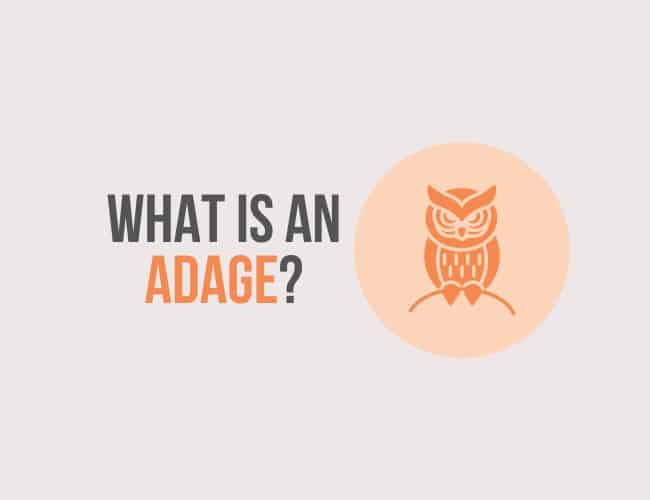As humans, we turn to others for advice or accepted wisdom when we need help. But you can find examples of adages all around you. But what is an adage?

Most people would say that the longer you live, the more wisdom you gain. Some follow social media accounts that offer notes of wisdom to their followers, others find they appreciate speeches with wisdom, like those studied in school years after the address was first given.
When you encounter a piece of wisdom, hopefully, it enriches you or reminds you how to live well. For those who read the Bible, books like Proverbs are full of such wisdom:
“Let the wise hear and increase in learning, and the one who understands obtain guidance, to understand a proverb and a saying, the words of the wise and their riddles.” These words from the biblical Book of Proverbs (1:5–6, ESV) provide us with insight into the purpose of many sayings, especially adages: to gain understanding. Adages and their kin provide us with a way to distill and transmit wisdom.
But what is an adage? Let's take a look.
What is an Adage? Definition
According to Merriam-Webster, an adage is “a saying often in metaphorical form that typically embodies a common observation.” An adage falls into the general classification of ‘sayings.' Its synonyms include aphorism, apothegm, epigram, gnomon, maxim, motto, proverb, and saw. Each of those has its own shade of meaning, and we will look at the difference between an adage and a proverb below.
The characteristics that set an adage apart are its brevity, pointedness, memorability, and veracity. An adage expresses an observation, general fact, or truth about life that most people accept as universal. It does not give advice but simply makes a statement.
Some adages may have flowery language or depend on figurative language, but an adage is most likely to have wide-reaching appeal if it uses everyday language instead.
Origin of Adage
The word comes into English through French adage (16c.) from Latin adagium, “adage, proverb,” which may derive from ad ‘to' + *agi- ‘say.' Other derivations have been suggested.
Individual adages come from humans observing the world around them and drawing conclusions, then expressing those conclusions in pithy, memorable statements. While some adages are relatively straightforward, others tend to be metaphorical, with hidden meaning. But they all come from the accepted wisdom of life experience.
Examples of Adage
- A penny saved is a penny earned. (Don't be wasteful.)
- Actions speak louder than words. (When actions and words are at odds, we should base our conclusions on actions.)
- All’s fair in love and war. (Justification for mean or unethical acts.)
- The early bird gets the worm. (Advice not to waste time.)
- Curiosity killed the cat. (Warning that asking questions may/will lead to unpleasant consequences.)
- Appearances often are deceiving.(Advice to look beyond the surface.)
- A stitch in time saves nine. (Advice to take preventative action.)
- A man is known by the company he keeps. (Be careful who your friends are.)
- Birds of a feather flock together. (Another way of saying #8.)
- Many hands make light work. (When a lot of people help, the work goes faster.)
- Out of sight, out of mind. (When you put something away, it's easy to forget about it.)
- Absence makes the heart grow fonder. (Time apart from someone you love reminds you how much you love them.)
- A fish stinks from the head down. (The leader of a group sets the example for what is considered acceptable behavior.)
- Bad company corrupts good morals. (From the Bible, this simple wisdom reminds you that you can be influenced negatively by those you spend time with.)
- It is more blessed to give than to receive. (From the Bible, this suggests generosity is important.)
Numerous adages can seem contradictory, such as “Too many cooks spoil the stew” vs. “Two heads are better than one.”
Or “Look before you leap” vs. “He who hesitates is lost.” So which one is true? Maybe both.
This brings us back to the opening quote. Wisdom and understanding arise from discerning when and how an adage, proverb, etc. is applicable to a situation. Which brings us to the question, “What's the difference?”
Adage vs. Other Sayings
How do you know the difference between an adage and other forms of collective wisdom? What are the subtle differences?
Saying: This is the broadest term for any short, commonly known expression and includes adages, proverbs, aphorisms, etc. It also feels informal in tone.
Proverb: Many people use proverb and adage interchangeably. Merriam-Webster, for example, informs us that a proverb is “a brief popular epigram or maxim : ADAGE .”
Others see proverbs and subsets of adages and make the following distinction: A proverb gives advice (e.g., “Look before you leap.”) whereas an adage makes an observation. (e.g., “Pride goes before a fall.”)
Many consider a proverb a kind of adage, so all proverbs are adages, but not all adages are proverbs. Proverbs do seem to mostly be attributed to folk wisdom than an adage, which may limit the proverb's applicability across cultures.
Aphorism: Aphorisms are concise statements conveyed in a witty or insightful way. Unlike adages, aphorisms are usually attributed to a specific author. Otherwise, the two words are synonyms.
Benjamin Franklin is famous for his aphorisms that he included in his publication Poor Richard's Almanack, such as this one: “Three may keep a secret, if two of them are dead.”
What does he mean? No one can keep a secret.
Apothegm: A terse, witty, and often contradictory statement is an apothegm. They are often pointed, carrying an element of irony or sarcasm.
Gnomon: A gnomon, or gnome, is a short, pithy statement of a general truth. It is often used in philosophical and theological contexts but otherwise considered obsolete.
Whether you prefer the simple wisdom of an adage or a saying based on more abstract ideas, these short notes of wisdom are here to stay.
Want to read more grammar, vocab, and literary device articles? Check out Robert's post on chiasmus here!
What is your favorite adage or bit of collective wisdom? Share in the comments.
PRACTICE
Now it's your turn. Can you create a new adage? Spend at least fifteen minutes and create a that illustrates at least on adage. It might take the form of a fable, since these story forms often end with a moral in the form of an adage. One example is “The Tortoise and the Hare,” which contains the moral/adage, “Slow and steady wins the race.” Have fun.
Share your practice in the Pro Practice Workshop, and leave feedback for a few other writers. Not a member? Join us.

Robert Harrell
Robert Harrell is a grammar nerd—and a language teacher, medieval re-creationist, musician, traveler, and theologian. His interests inform his stories and coaching. Published in German, Spanish, and French, with two English-language YA/NA series underway, Robert is pursuing The Write Practice Book Coach Certification to help other writers excel. Learn more at his website.
0 Comments